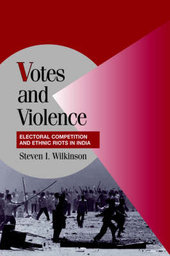
|
Votes and Violence: Electoral Competition and Ethnic Riots in India
Hardback
Main Details
| Title |
Votes and Violence: Electoral Competition and Ethnic Riots in India
|
| Authors and Contributors |
By (author) Steven I. Wilkinson
|
| Series | Cambridge Studies in Comparative Politics |
|---|
| Physical Properties |
| Format:Hardback | | Pages:312 | | Dimensions(mm): Height 229,Width 152 |
|
| Category/Genre | Political economy |
|---|
| ISBN/Barcode |
9780521829168
|
| Classifications | Dewey:322.40954 |
|---|
| Audience | | Professional & Vocational | |
|---|
| Illustrations |
5 Maps; 6 Halftones, unspecified
|
|
Publishing Details |
| Publisher |
Cambridge University Press
|
| Imprint |
Cambridge University Press
|
| Publication Date |
19 July 2004 |
| Publication Country |
United Kingdom
|
Description
Why do ethnic riots break out when and where they do? Why do some governments try to prevent ethnic riots while others do nothing or even participate in the violence? In this book, Steven I. Wilkinson uses newly collected data on Hindu-Muslim riots, socio-economic factors and competitive politics in India to test his theory that riots are fomented in order to win elections and that governments decide whether to stop them or not based on the likely electoral cost of doing so. He finds that electoral factors account for most of the state-level variation in Hindu-Muslim riots: explaining for example why riots took place in Gujarat in 2002 but not in many other states where militants tried to foment violence. The general electoral theory he develops for India is extended to Ireland, Malaysia and Romania as Wilkinson shows that similar political factors motivate ethnic violence in many different countries.
Author Biography
Steven I. Wilkinson is Associate Professor of Political Science at the University of Chicago, where he teaches comparative politics. His first book Votes and Violence: Electoral Competition and Ethnic Riots in India (Cambridge 2004) was co-winner of the American Political Science Association's 2005 Woodrow Wilson Foundation prize. He is currently researching the links between colonial inheritances and post-independence levels of democracy, governance and conflict.
Reviews'In this important book, Wilkinson provides strong arguments against some prevailing theories concerning the causes of interethnic violence in competitive political regimes, including those that associate it with state strength or weakness, the presence or absence of consociational arrangements and practices, or 'civic engagement' through 'interethnic associations'. To the contrary, he provides persuasive evidence, from contemporary India and other parts of the world, that electoral calculations and governmental will are decisive factors in promoting or preventing interreligious and interethnic violence.' Paul R. Brass, Professor Emeritus of Political Science and South Asian Studies, University of Washington 'Wilkinson combines area expertise with a mastery of the literature and theoretical and methodological sophistication. He leaves little doubt as to the validity of his claims that electoral competition is causally related to ethnic rioting in India and demonstrates that state weakness or economic competition alone cannot explain the complexity of ethnic violence. By expertly linking the broader comparative politics literature on electoral politics to the literature on ethnic violence, Wilkinson raises the bar for scholars working on the political economy of violence.' Nicholas Sambanis, Yale University 'In the 1990s, a strikingly odd argument emerged in some quarters that a scientific study of comparative politics necessarily required comparison across countries. This book is a striking proof of the counter-argument that countries are not cases that scientific in-country comparisons can be made, if states, provinces or cities of a country are the legitimate units of analysis; that science depends not on where one studies a problem, but on how one studies it. Even when I disagreed with the substantive arguments of this book, I greatly admired the methodological sophistication Wilkinson brought to bear on a truly interesting social science question: how does one explain why some parts of a country often have ethnic violence, whereas other parts remain quiet?' Ashutosh Varshney, University of Michigan, Ann Arbor 'Wilkinson's volume is a valuable addition to the literature on ethnic violence in general and ethnoreligious violence in India in particular.' Nations and Nationalism
|